



To read any of the obituaries of the people listed, click on their name and you will be taken to the particular item.
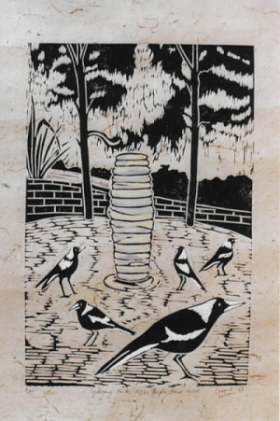 |
This linocut was done by Lenore Bassan for the SPAIDS Reflection Area in 2006 |

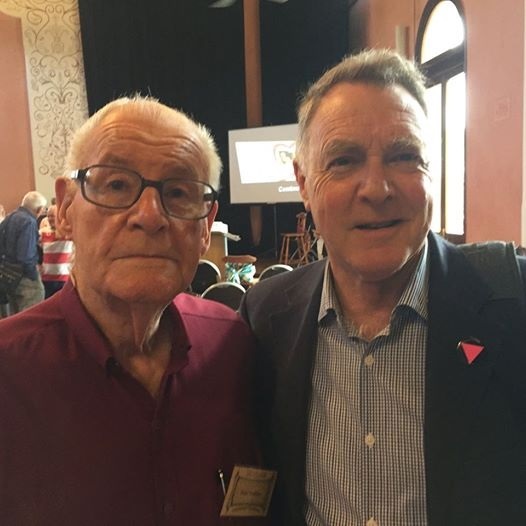
I've just been informed of the death mid-week of Peter Trebilco OAM. Long a stalwart of the Gay & Lesbian Counselling Service, the Public Health Association and the Australian Society of Genealogists, he was also a supporter of gay law reform in the 1980's and, of late, Sydney's Pride History Group, of which he was made a Life Member. Peter was one of the kindest men I've known, and always supportive to me personally. I was so looking forward to his 90th Birthday celebrations in December. A sad week in a bad year for the loss of our pioneers.
Australian Lesbian and Gay Archives added 4 new photos.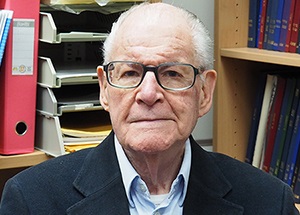
It is with great sadness that we share the news of the loss of Peter Trebilco. Peter was born on 15 December 1927 in Hawthorne, Victoria, and would have turned 90 in 2017. Peter Trebilco was an academic at UNSW from 1972 to 1980, and has been an honorary Visiting Fellow at the School of Public Health and Community Medicine, UNSW since 1981. He was actively involved in teaching and academic life, with a focus on social determinants of health and illness, mental health, its prevention and promotion and diversity, particularly in relation to LBGTQI matters. He taught in the UNSW Medicine program and in our postgraduate coursework programs.
He was a life member and past Treasurer and Vice President of the Public Health Association of Australia and previously treasurer, Australasian Bioethics Association. He was also the Chairman of the Mental Health Association NSW, a Life Member of Way Ahead Mental Health Association NSW; a Life Member, Counsellor emeritus, Gay and Lesbian Counselling Service of NSW and a member of the International Symposium on Ethics of Environmental Health. He was an author, with Prof Martin Prince, ‘Mental health services for older people: a developing countries perspective’ in Psychogeriatric Service Delivery, Draper B, Melding P & Brodarty, H, OUP, Oxford, 2005, and had many other professional achievements.
Most of all, we remember him for his active engagement with UNSW, with public health, and with his passion for life and for humanity. He has a desk at SPHCM and was here at least weekly, always stopping for a chat and connecting with his many colleagues. He will be sadly missed by his friends and colleagues at UNSW.

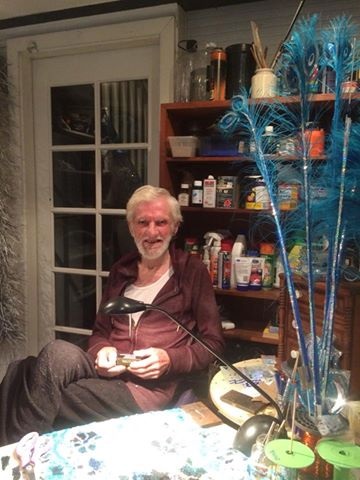
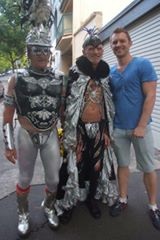
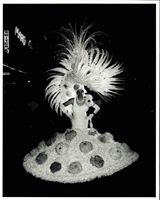
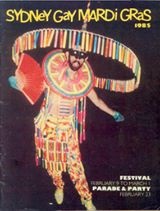
Legendary Sydney Gay and Lesbian Mardi Gras costume designer Ron Muncaster passed away at a hospice in Darlinghurst on Tuesday. He was 81.
Ron’s incredible costumes have wowed Mardi Gras Parade crowds since the early 1980s, winning the very first best costume award in 1984. Along with partners including Michael O’Halloran, Jacques Straetmans, John English, and Craig Craig, and often with an entourage or group, Ron went on to create ever larger and more elaborate costumes, winning countless awards.
Ron was a donor and friend of the Archives, and his contributions to Mardi Gras and Sydney will be missed.
Committal service will be held at Eastern Suburbs Crematorium, South, 12 Military Rd, Matraville, NSW, Australia on Monday, 6th November 2017 at 1:00pm.
Liz Ross
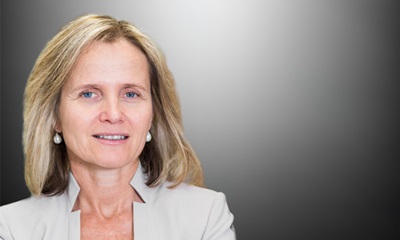
LEVINIA Crooks, AM, Chief Executive Officer of the Australasian Society for HIV, Viral Hepatitis and Sexual Health Medicine (ASHM) and adjunct associate professor at the University of New South Wales and Latrobe University, died on 16 October 2017 from progressive non-Hodgkin lymphoma.
Levinia was a close colleague and friend for over 15 years. I had the pleasure of working closely with her when I was President of ASHM from 2005 to 2007. We also worked together as members of the organising committees for the 4th International AIDS Society Conference on HIV Pathogenesis, Treatment and Prevention in Sydney, in 2007, and the 20th International AIDS Conference in Melbourne, in 2014. Both meetings were major international events that brought thousands of people from across the globe to Australia.
I saw Levinia’s capacity for hard work, her outstanding skill in bringing diverse groups together and her ability to form professional relationships with everyone and anyone. She did her work with passion and an unwavering commitment to science, evidence-based practise, robust and informed government policy and a deep understanding that engagement of community was at the centre of everything. She loved Australia and was immensely proud of its response to HIV, and wanted these strategies to be shared and adopted by our neighbouring countries.
Throughout Levinia’s tenure as CEO of ASHM, she worked with almost every clinician, researcher and community leader in the HIV, viral hepatitis and sexual health sectors. In the HIV sector, in particular, she has influenced, mentored and inspired an entire generation of professionals. She taught us all a way of making a difference in the work each of us do – to be strategic, be inclusive, do it in partnership, always use the best evidence to inform practice and never be complacent. Levinia was the consummate professional, but she always brought warmth, empathy and a sense of fun to her work.
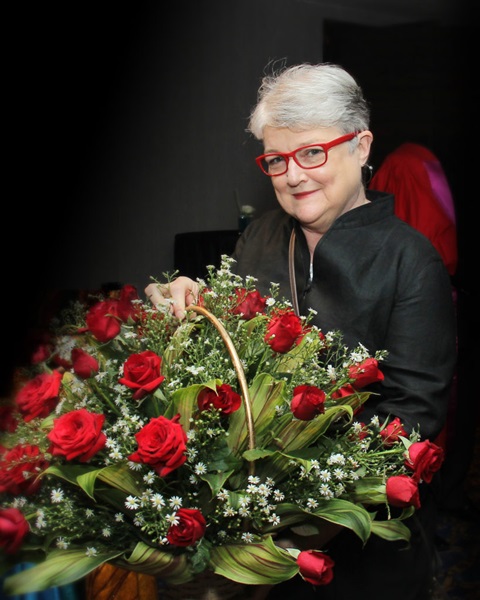
Levinia Crooks: a tribute to a sexual health champion - Featured Image
Acknowledgements of Levinia’s death are littered with words of strength and respect. She befriended, encouraged, persuaded, inspired, challenged, was tireless and passionate, extraordinary, energetic and influential. For those who worked with her, her passing is intensely sad. For those who follow in her path, it is worth considering the incredible impact one person can have. At the Australasian HIV and AIDS Conference this week, we will all take a moment to reflect on her achievements.
Levinia graduated from the University of Wollongong with a Bachelor of Arts degree with Honours in Psychology and had a Master of Business Administration degree from the University of New England.
In the 1980s, at the very beginning of the AIDS epidemic in Australia, she became the manager for the Wollongong AIDS Research Project. She went on to become the first executive officer of the National Association of People with HIV Australia (NAPWHA).
Her work throughout the 1990s included running counselling workshops for the Northern Territory AIDS Council, formulating an evaluation strategy for services to people living with HIV and AIDS with the Commonwealth government, and developing a national media campaign promoting health monitoring and early diagnosis for people living with HIV for the Australian Federation of AIDS Organisations. She managed the HIV Prescribers’ Continuing Medical Education Project for the South Eastern Sydney Area Health Service in the late 1990s.
From late 1999, she was the CEO of ASHM, a position she held until ill-health forced her to retire in September 2017.
Under her leadership, ASHM extended its mandate from HIV to viral hepatitis and sexual health. She brought with this change the values and principles that shaped the HIV response from the beginning – outstanding advocacy, meaningful partnerships, a priority on community-based and patient-centred care and engagement at all times with people living with HIV, viral hepatitis or sexually transmissible infections (STIs).
Among her many contributions during her tenure at ASHM, she advocated, contributed to and shaped the national strategies for HIV, viral hepatitis and STIs. She coordinated the Pharmaceutical Benefits Advisory Committee application to remove the limitations on prescribing antiretrovirals based on CD4 T-cell count, making Australia one of the first countries to approve the initiation of antiretroviral treatment for all people living with HIV. She advocated tirelessly for appropriate pricing of direct-acting antivirals for hepatitis C and led the development and implementation of national guidelines for the use of pre-exposure prophylaxis for the prevention of HIV infection.
Within the Asia–Pacific region, ASHM became widely known for its outstanding education programs, successful advocacy with government and its commitment to developing multidisciplinary leadership across the sector. Many similar organisations across the region model themselves on ASHM and representatives often sought Levinia’s advice and mentorship. Her commitment to bringing services to those living with HIV, viral hepatitis or STIs was as well known in Port Moresby as it was in Sydney and Melbourne.
Levinia’s contributions were publicly recognised in 2008 when she was appointed Member of the Order of Australia for her services to HIV, and she was granted the President’s Award from the AIDS Council of New South Wales in 2015 for her leadership in the HIV sector.
Professor Sharon Lewin is the director of the Peter Doherty Institute for Infection and Immunity. The author acknowledges helpful comments from Brent Allen, Andrea Fischer, Edwina Wright and Miranda Smith.

Some of Pauline's story is on the blog at the following link, and as more information comes to hand it will be added to the blog as an ongoing project:
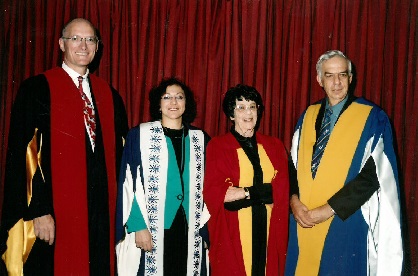
From left to right we believe we have: Chairman of Council The Honourable Justice E.Cameron, Joy Christine Nalukwago Lwanga-Luma, Pauline Sheila Lipson, President of Convocation Professor John Schochot (on the occasion of Pauline being presented with an honorary degree of Doctor of Laws at the University of the Witwatersrand, Johannesburg on 10 APRIL 2001).

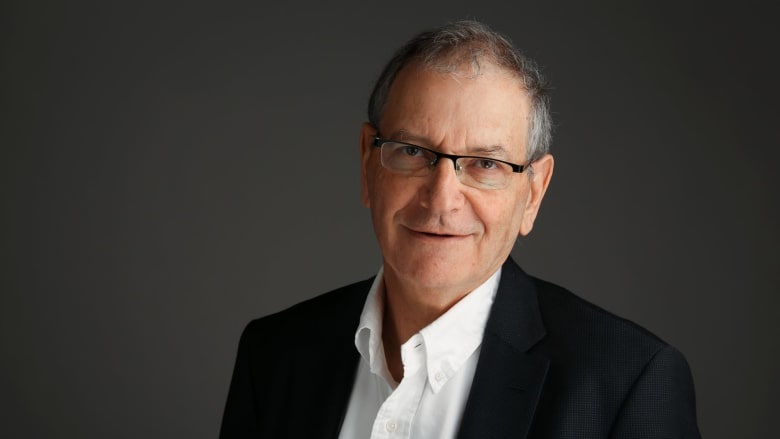
Published 27 March 2018 by the Sydney Morning Herald
Professor David Cooper, an Australian clinician and researcher, played a leading role in the global fight against HIV. He was there right at the beginning of the HIV epidemic, and dedicated his career to the twin tasks of caring for patients, and doing the research needed to stop the deadly infection in its tracks. He contributed to the development of virtually every drug used in HIV treatment. All over the world he was respected as a leader, and at home he was an insightful colleague and unparalleled mentor to the many researchers, clinicians and community members who joined him in the fight against HIV.
Born in Sydney in 1949 to Jewish immigrant parents Annie and Max – Annie's family (the Lazarus') had come to Australia via England and before that Lithuania, his father had migrated to Sydney from Poland arriving before the outbreak of war. His father ran a Men's Tailoring store in the city – and the children David and his older sister, Bettina, were raised in Dover Heights.
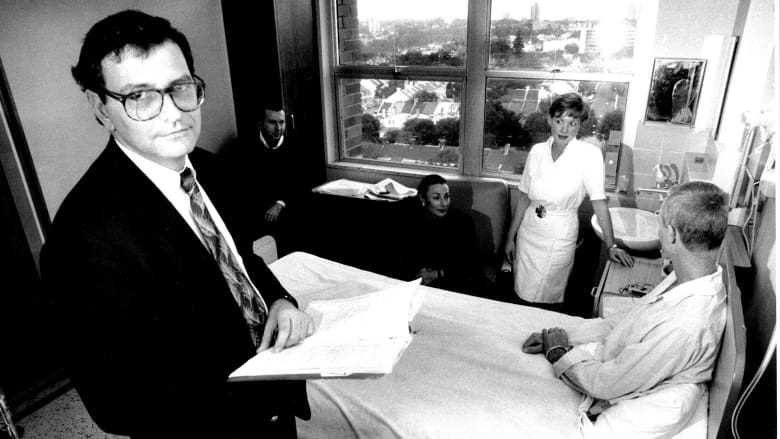
For the next decade Cooper seemed to be following a promising but perhaps conventional career track in clinical immunology, with a steady output of research. He found, and married Dorrie, the love of his life, and their first daughter was born. The turning point for David's career was the young family's move to Boston for two years in 1981, just as the first AIDS cases were appearing in the US. David saw what could happen in Australia and, on his return, immediately threw himself into clinical care at St Vincent's Hospital, where cases were indeed starting to appear. He promptly began a research program aimed at getting a better understanding of the emerging epidemic, and what treatments might be effective. He was the first in the world to describe the so-called "seroconversion illness," which occurs at initial HIV infection in many people.

The politics surrounding HIV were complicated by the fact was that most people with HIV in Australia were gay men. The "sodomy laws", which been used to persecute many gay men had been repealed in some parts of Australia but not everywhere. There were still many areas of official and unofficial discrimination, and mainstream health services were no exception. But at St Vincent's Hospital, Cooper and his close colleagues with the support of the Sisters of Charity opened their doors to provide the best care that anyone could in those early days.
His patients speak of a doctor who would provide reassurance in the face of what many found to be a frightening, and at the time little understood illness. He always made himself available by phone, and in the early days, by the hospital bed. Cooper often reflected that his Jewish heritage helped him to understand discrimination, and to better empathise with his patients.
He also understood that he needed to operate at a higher level. The stars aligned with Neal Blewett as Minister for Health, and a supportive Opposition spokesperson, Peter Baume ensured that there was bipartisanship in developing the national, strategic approach required to combat HIV. The St Vincent's team, led by Cooper, put forward a plan for a new research centre, which would take on the tasks of tracking the epidemic and making sure that people with HIV had the best chance of accessing new treatments as they became available. It was this centre, based at the University of New South Wales, that ultimately became the Kirby Institute honouring Cooper's great friend and ally, Michael Kirby who considered that Cooper's special gift was having both "a huge intellect and a huge heart." He saw that Cooper's intellect made him a global leader in research, but it was his heart that was on display every day to his family, his colleagues and his patients.
At a crucial moment in global HIV history, Cooper was elected President of the International AIDS Society. He used his influence to make sure that the global HIV conference in 2000 was held in Durban, taking it for the first time to the region of the world most affected by HIV. This move was designed to show the world that treatment needed to be available to all, not just people in rich countries. Within a year of the conference, what had once seemed like an idealistic dream started to become a reality, as billions of dollars were committed to treatment access in low and middle income countries. HIV still remains one of the few diseases in the world for which global equity in treatment is the standard. Cooper firmly believed that collaboration in medicine and research was the way to build a strong evidence-base, ensuring his research would translate to the real world.
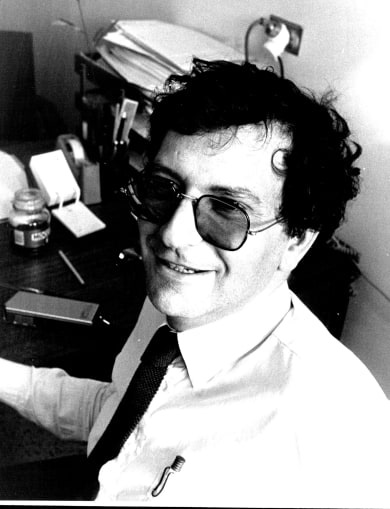
He also saw community partnerships as an essential element to developing research to improve the lives of people with HIV. Beyond his daily, demanding clinical work, he engaged closely with advocates who spoke on behalf of people with HIV and what were broadly known as "affected communities" – gay men, people who engaged in sex work, people who used illicit drugs – to best understand their concerns and needs. In 1999, he led the Kirby Institute's first entry in the Mardi Gras parade, accompanied by dozens of staff members and his then teenage daughters Becky and Ilana, him wearing a lab coat and the girls participating in a choreographed dance routine playing the role of life-saving HIV medication.
Another key element of Cooper's work was setting up networks of clinicians working on trials together, to accelerate the research and make sure that patients, no matter where they were, could join a study and get access to the best available treatments. He was one of the triumvirate of professors who founded HIV-NAT (Netherlands, Australia, Thailand), in Bangkok, that is now the acknowledged leader in Southeast Asia in HIV treatment research.
Professor Praphan, Director of the Thai Red Cross AIDS Research Centre and one of the three professors who initiated HIV-NAT, has expressed how Cooper inspired the work that he and his colleagues were able to carry out, and his determination to carry on his vision. "Let those of us who remain become stronger to follow David's footsteps and put an end to AIDS."
Cooper went on to lead HIV research in Indonesia and Cambodia, and in 2017 he set up a new infectious disease collaboration in Myanmar.
As the Director of the Kirby Institute, he created the environment in which people could flourish and feel supported. He would listen, nod quiet approval, and provide essential and strategic support to turn ideas into reality. In moments of conflict, he was the mediator, identifying the way forward that made everyone feel that their perspective had been valued.
David Cooper is survived by his wife, Dorrie, daughters Becky and Ilana, and two grandchildren.
By John Kaldor, Anthony Kelleher, Becky Cooper, Ilana Cooper
The following article is from the National Association of People with HIV Australia - 8 Mar 2018
Tributes are pouring in for one of the HIV community's most-loved figures and cherished heroes, Tony Maynard, who passed away on Thursday 8 March after complications from a brain infection. Tony was a pre-eminent source of information on HIV treatments support for thousands of people living with HIV in Australia over his 30-plus years connected to the sector.
Tony was the first Treatments Officer at the Victorian AIDS Council (VAC); Treatments Project Officer at the National Association of People with HIV Australia (NAPWHA); Senior Education Officer at the Australasian Society for HIV, Viral Hepatitis and Sexual Health Medicine; and Treatments Officer at the AIDS Council of NSW. His last role in the sector was as a board member for VAC.
Even when employed outside the sector as an HIV consultant for Janssen Pharmaceuticals, Tony was instrumental in developing closer relationships with industry and community to benefit his main goal: looking after the health and wellbeing of people with HIV. Indeed, while at Janssen, Tony was responsible for bringing three important HIV drugs to the Australian market.
During his career Tony was awarded the HIV Sector Partnership Award in 2001; and the Pat Clear Award from Medicines Australia in 2011 for his contribution to the Collaboration for Health in Papua New Guinea.
"We have lost a great resource and a very wise counsel to many PLHIV,” said NAPWHA President, Cipri Martinez, responding to the news. “But most of all we have lost a wonderful personality and friend who would always greet everyone with a broad smile, his great sense of humour and his warm demeanour."
Aaron Cogle, Executive Director at NAPWHA, also paid tribute to Tony whose last full-time role — as Treataware Project Officer — was at the organisation. "Tony was great to work with and had such tremendous experience in HIV medicine and treatments. We could rely on him to use his many years' experience and accumulated wisdom to guide our policy development and to strengthen our partnerships using his extensive networks,” said Cogle. “Many people in the HIV sector across the country are feeling a great sense of loss at Tony's passing. He was well-loved and admired.”
David Menadue was president of People with AIDS Victoria and on the interview panel which recruited Tony as Treatments Officer at VAC in the early 1990s. "It was the worst of times for anyone to take on the role, looking after the treatment needs of PLHIV when there really were no effective anti-HIV treatments. But Tony took to the role with vigour to learn as much as he could as quickly as possible to try to save lives,” said Menadue. “I have the greatest admiration for the commitment Tony showed to us for so many years and the quality of advice he gave people in such uncertain times. Tony is appreciated and loved by the HIV community around Australia. This is a truly great loss for us."
Thoughts go out to Tony's partner, Christian, and his family at this very sad time. Tony will be remembered as a treasured colleague, a caring mentor, a passionate advocate, a dedicated member of the community, and as a truly remarkable person. RIP Tony. You will be sorely missed.
Further item about Tony Maynard: ASHM eNews (Australasian Society for HIV, Viral Hepatitis and Sexual Health Medicine) Research Sector News 8 March 2018Today, the staff and Board of ASHM adds their voices to the messages of condolence on the passing of Tony Maynard. We were honoured to have him as part of the ASHM team as a Senior Education Officer in the early 2000s—an era of greater optimism in the HIV epidemic bought on with new treatments—ensuring that a generation of clinicians properly met the needs of their patients in providing high-quality HIV treatment and care services.
He was passionate about ensuring no one was left behind in the HIV response and that everyone could access the treatment, care and support they needed. Along with his service at ASHM, he also worked with ACON in the Enhanced Primary Care Project as well as with the National Association of People with HIV Australia (NAPWHA) as their Treataware Project Officer. He also worked together with pharmaceutical companies to help bring vital HIV drugs to market in Australia.
With an established focus on HIV treatment throughout his career, Tony was excited to join the VAC board at a time when biomedical prevention’s role in ending HIV was being fully realised with the introduction of pre-exposure prophylaxis (PrEP) and the impact of an undetectable viral load in people living with HIV.
In the 1990s, Tony’s work in the PLWHA program when deaths from AIDS were a weekly, sometimes daily, occurrence was characterised by sensitivity, care, generosity of spirit and genuine regard for the clients—many of whom were friends of Tony’s from the community.
Serving on the current board of VAC, CEO Simon Ruth said, “Today, we lost piece of our history and our legacy. As a community-led organisation, we are indebted to LGBTI community elders like Tony who have stayed with us — from our formation in response to HIV through to our current battles to ensuring the ongoing health and wellbeing of our LGBTI communities.”
VAC President Chad Hughes added, “Tony brought a wealth of experience and wisdom to VAC. His legacy is woven into the fabric of so many of the organisations that played a vital role in the Australian response to HIV and AIDS. We will miss his unwavering dedication but will feel the impact of his valuable contribution in perpetuity.”
Tony was an enduring and integral part of the response to HIV in Australia over three decades across an enviable range of roles and contributions and will be sorely missed.

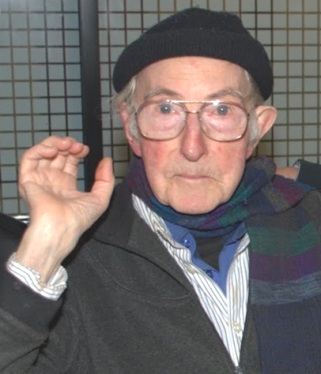
David was a First Fleeter and a ‘78er. He was born in northern Tasmania in 1926 (exactly 2 months before the Queen) and moved with his family to Sydney in 1935. He attended Shore School and near the end of WW2 joined the RAAF, being based in Cootamundra and then Albert Park in Melbourne. He was a frequenter of the Cinderella Coffee Shop in Collins Street and a friend of the poet, Harold Stewart.
At various times, David was a member of, or associated with, Camp NSW, Acceptance, Sydney MCC, Mature Age Gays, gay groups at Sydney University, poetry groups, the Australian Electric Traction Association, and the Theosophical Society. He also loved trivia nights, history, paintings and talk-back radio.
David died on 12th April and is buried in Tasmania. A memorial function for him was held at Sydney University on 12th May.
Posted by: Colin Smith
From the Advocate
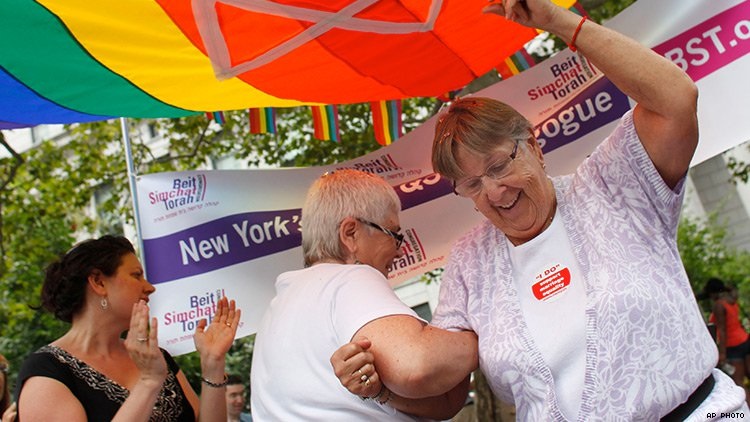
Game-changing activist Connie Kurtz, a subject (along with her wife, Ruth Berman) of the 2002 documentary Ruthie and Connie: Every Room in the House, who famously sued the New York City Board of Education for domestic-partner benefits in the late 1980s, died Sunday at 81 in her home in West Palm Beach, Fla., following a long illness, according to Gay City News.
Born in Brooklyn in 1936, Kurtz was initially married to a man, and she moved to Israel in 1970 with her husband and family. She spent four years there before returning to the United States, where she rekindled a friendship with her old friend Berman. The pair fell in love, divorced their husbands, and carved out a life for themselves, eventually legally marrying in New York in 2011.
In 1988 Berman was working at New York City’s Sheepshead Bay High School, where she was a guidance counselor and physical education teacher. But because they couldn't marry, Berman could not carry Kurtz on her health and insurance benefits. The couple sued for domestic-partner benefits to the tune of $1 million, landing them appearances on The Phil Donahue Show and Geraldo to discuss the case and equal rights.
When members of the audience at The Phil Donahue Show criticized Kurtz and Berman for failing to remain quiet and closeted, Kurtz replied to one openly homophobic white woman, “We are forced to literally say, ‘We’re here and we’re standing tall and you better recognize us.’” Their suit eventually resulted in domestic-partner benefits for all New York City municipal employees.
Lifelong activists, Kurtz and Berman went on to found branches of PFLAG in New York and Florida. In 2000 they became cochairs of the Lesbian Rights Task Force of the New York State Chapter of the National Organization for Women, according to Gay City News.
Rabbi Sharon Kleinbaum, friend and rabbi to Kurtz and Berman, officiated the women’s 2011 wedding ceremony and also a religious ceremony they held in 2000 when same-sex marriage was not yet legal anywhere in the United States.
“Connie was a force of nature. Everyone who encountered her — even for the first time and even briefly — felt her passion, her love, her fierceness, and her humor,” Kleinbaum said upon Kurtz’s passing. “Connie and her love Ruthie changed the world and never lost the love of life, of art, and of all of her people. I am sending my love to Ruthie and all who are in grief over this terrible loss. A great light has gone out in our world. May her memory forever bless us and may our lives be forever a blessing to her memory.”
A leader in LGBT activism for decades, Kurtz didn’t show signs of slowing down with age. Kurtz and Berman were honored with SAGE’s (Services and Advocacy for GLBT Elders) Pioneer Award. They also founded The Answer Is Loving Counseling Center in their hometown of West Palm Beach. The couple worked there for 20 years.
If Kurtz’s history of fighting for LGBT rights and recognition weren’t enough during her lifetime, SAGE introduced federal legislation to aid LGBT elders that the organization named the Ruthie and Connie LGBT Elders Act, which if passed would help carry on her legacy while helping to improve the lives of others.
Kurtz remained active, taking up causes for LGBT people, women, and for people of color with Black Lives Matter. She also became passionate about painting in the mid-’90s, according to Gay City News.
“Words can’t explain how sad we are that Connie has passed. We send our love and condolences to Ruth,” SAGE CEO Michael Adams said. “And we celebrate and honor Connie’s fierce and passionate legacy, which has made the world a better place for so many of us.”
Rabbi Kleinbaum officiated Kurtz’s funeral today at Star of David Cemetery of the Palm Beaches in West Palm Beach.

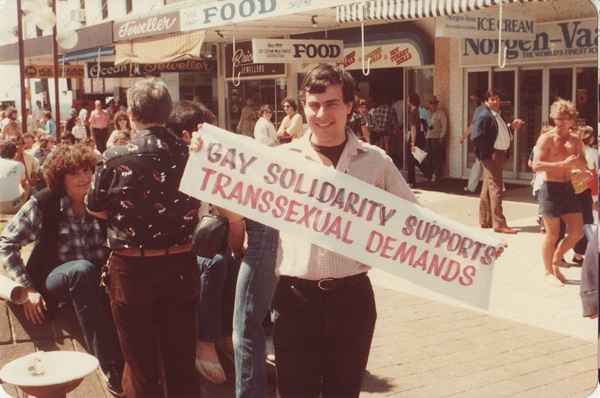
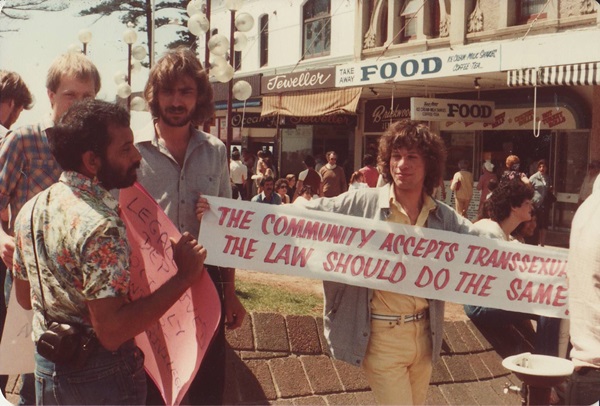
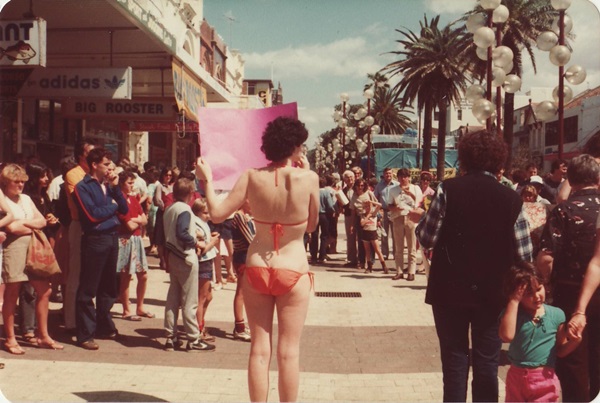
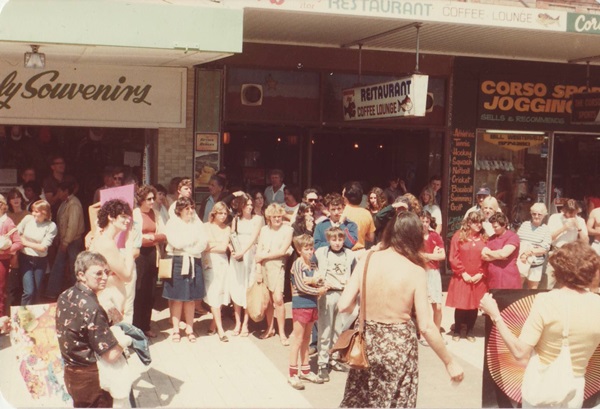
Academic and writer on sex workers' rights.
Originally transsexual in the 70s and 80s
Lobbied for social and legal reform
Gay Solidarity Group (GSG) supported her coming out in Manly in the early 80s at a demo in the main street, the Corso.
Above biographical notes supplied by Kendall Lovett on 1 JULY 2018The following article on Roberta Perkins is from the Star Observer online:
"Much of the work conducted by sex worker organisations today still takes its cues from Roberta's early work."
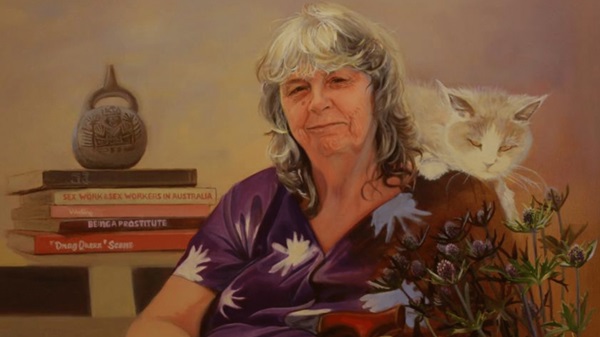
Tributes have flowed in for Roberta Perkins, a trailblazing Australian advocate for trans and sex worker rights, after she passed away on Tuesday, aged 78.
Perkins was an academic and writer, authoring numerous books on sex work in Australia and using her platform to fight for sex worker rights.
In the 1980s she became a member of the Australian Transsexual Association, which supported trans people by lobbying for social and legal reform.
Perkins’ research on the lives of trans people in Kings Cross drew the attention of Frank Walker, then State Minister for Youth and Community Services, and led to the establishment of a refuge in Petersham for homeless trans people, which later became The Gender Centre.
Perkins was a founding member of the former Australian Prostitutes Collective NSW, which advocated for decriminalisation of sex work to improve the lives of workers in the state.
The organisation’s work is today continued by the Sex Worker Outreach Project (SWOP) NSW.
“It would be hard to quantify the number of trans people and sex workers that have benefited from Roberta’s work and legacy,” said SWOP NSW and national sex worker body Scarlet Alliance in a joint statement.
“Much of the work conducted by sex worker organisations today still takes its cues from Roberta’s early work, addressing the complex and intersecting needs of sex workers, while simultaneously working on reducing the structural and systemic barriers sex workers face.
“Roberta was a trailblazer and her impact on the health, safety and rights of sex workers and trans people has been vast and enduring.
“She will be greatly missed. Vale, Roberta Perkins.”
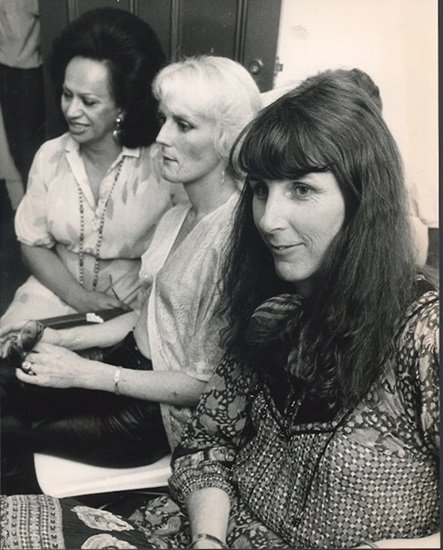
Sex worker organisations and peers have flooded social media with tributes and memories of Perkins, her life and her work.
Eurydice Aroney @eekiemout
Roberta Perkins born Adelaide 30.04.1940 died Sydney 26.06.2018 used her incredible intellect, drive and courage to fight injustice towards trans people and #sexworkers and things were never the same again. Here with former showgirl Carmen Rupe and friend. Adios my darling xx
Her friends and family invite all to attend a celebration of Perkins’ life tomorrow, Friday June 29, at 12 pm.
The service will be held at The Anne Wilson Funeral Chapel, at the corner of Barrenjoey Rd and Darley St in Mona Vale.

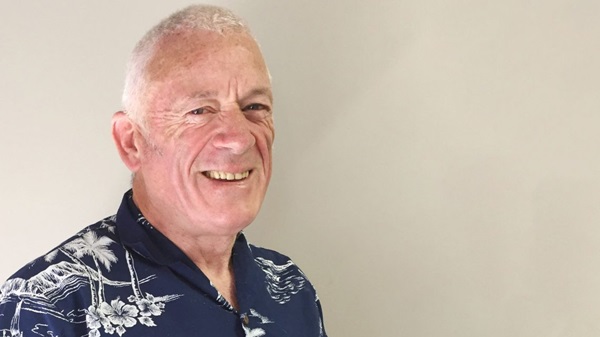
Community leader and activist Jim Hyde has passed away over the weekend, leaving an indelible and important legacy in his wake.
As both a life member of Thorne Harbour Health (formerly the Victorian AIDS Council) and its general manager in the early nineties, Hyde guided the organisation in its relocation to South Yarra, where it remained for 23 years.
He was also at the helm when the first Positive Living Centre opened in St Kilda, and was a founding member of the AIDS Council of South Australia and the South Australian Gay and Lesbian Rights Lobby.
Thorne Harbour Health President, Chad Hughes, said Hyde’s almost 30-year involvement with the organisation was characterised by passion, intelligence, strategic insight, and a fierce commitment to the HIV and AIDS sector.
“He was a great strategic thinker, a skilled negotiator and policy expert, and a generous elder of our community,” he said.
“Whenever we came across complex issues related to the organisation, Jim was always ready with sage advice and critical insights that I personally, and the organisation as a whole, benefitted from.
“From the sale of our previous premises in South Yarra to our recent rebrand and countless other matters, his legacy is significant.”
Hyde also held senior positions in both the New South Wales and Victorian departments of health, including serving as Victoria’s Director of Public Health, and was awarded the inaugural Rainbow Award for Leadership in the Gay Community in 1993.
Chief Executive of Thorne Harbour Health, Simon Ruth, said Hyde’s insights were always informed by a keen sense of where the organisation had been historically, what it needed in the present, and how it could develop for future sustainability.
“He brought to our organisation, and LGBTI people more generally, a deep community knowledge informed by passion and determination,” he said. “He will be missed.”
Other community leaders have taken to social media to champion Hyde’s lasting legacy.
Victoria’s gender and sexuality commissioner, Ro Allen, said they were sad to hear of Hyde’s passing.
“Jim was a larger than life character who spent his entire career advocating for LGBTI rights,” they posted on Facebook.
“His legacy is enormous and will live on.”
Co-founder of the Institute of Many (TIM), Nic Holas, said Hyde was “bloody pushy, loved a rant, and wasn’t afraid to speak his mind”.
“We owe so much to our HIV elders,” he wrote.
“We stand upon their shoulders, they who put their bodies on the line at protests, and in laboratories, so that we may be live with HIV openly and pop our daily pharma freedoms without side effects, without fear.”
Hyde is survived by his daughters, Sophie and Alice, their families, and his partner Glenn.

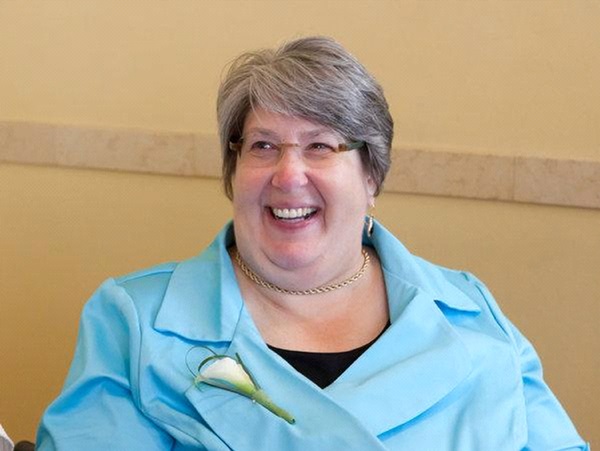
Janet Weinberg in 2011. She was an official at the Lesbian & Gay Community Services Center and later at the Gay Men’s Health Crisis.CreditCreditSara Krulwich/The New York Times
By Richard SandomirNew York Times 14 September 2018
•Janet Weinberg, an advocate for people with disabilities who found her calling as a top executive and fund-raiser at social service organizations like the Gay Men’s Health Crisis, died on Sept. 1 in the Bronx. She was 63.
Her spouse, Rosalyn H. Richter, an associate justice of the Appellate Division of the New York State Supreme Court, said the cause was a chronic heart condition.
Ms. Weinberg had been an occupational therapist for a decade when she accepted an offer to join the board of the Lesbian & Gay Community Services Center in Manhattan in the mid-1990s. It was a career transition she had been preparing for after building a reputation as a politically savvy activist for people with disabilities and hoping one day to help a population still affected by the AIDS epidemic.
She had never forgotten an incident in 1985, when she was working as an occupational therapist at a nursing home in Rockaway Beach, Queens, and the community erupted in protest against a city proposal to transfer dying AIDS patients there from hospitals.
“They were never allowed to enter the nursing home,” she said in a video statement posted by the Gay Men’s Health Crisis in 2010, recalling how the city had backed down to local pressure. “The community blocked it. It was all about homophobia and hatred.”
As the lesbian and gay center’s co-chairwoman and then its director of development, Ms. Weinberg helped lead the $14 million fund-raising effort that renovated its 19th-century headquarters in Greenwich Village. More important, having been disabled in the 1980s by an illness that required her to use a wheelchair, Ms. Weinberg brought a new and impassioned voice.
“She could talk to a lot of different kinds of elected officials, even those who didn’t agree with us,” Richard Burns, a longtime former executive director of the center, said in a telephone interview. “And she knew how to use her wheelchair with them — she would body-block them until they heard her message about policy, L.G.B.T. issues, disability access or drug reform.”
She was recruited to join the Gay Men’s Health Crisis in 2005. There her work in fund-raising — including organizing an AIDS walk in 2008 that drew 45,000 people and raised $7.4 million — led to her being named chief operating officer four years later.
Ms. Weinberg was adept at raising money at the G.M.H.C. even after the urgency of the AIDS epidemic had passed. She worked on developing programs to help clients obtain their high school equivalency diplomas and manage financial planning and immigration issues.
“She knew what it took for people to prevent being infected, but also what it took for them to live healthier, more fulfilling lives,” Ana Oliveira, who, as the organization’s executive director, recruited Ms. Weinberg, said in a telephone interview.
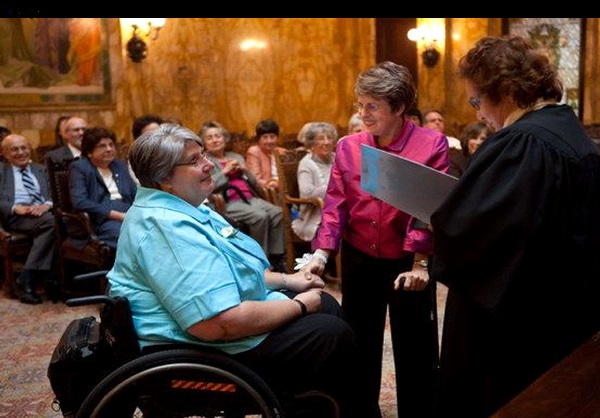
Ms. Weinberg married Rosalyn H. Richter, an associate justice of the Appellate Division of New York State Supreme Court, at the courthouse in Manhattan in 2011, two months after same-sex marriage was legalized in New York State.CreditSara Krulwich/The New York Times
Still, by 2013 the center was running a deficit, and its chief executive, Dr. Marjorie Hill, had resigned after seven years. Some said the G.M.H.C. and other long-established groups had grown timid and were no longer viewing AIDS with enough alarm.
Ms. Weinberg, who was named the interim chief executive, told The New York Times that the agency remained focused on “high-impact prevention” practices.
She left the center the next year.
Janet Inez Weinberg was born in Manhattan on April 3, 1955, and grew up in Highland Park, N.J. Her father, Herbert, was a stockbroker, and her mother, Esther (Hariton) Weinberg, was a homemaker who died when Janet was 3. Her stepmother, May, later entered her life.
After attending Hofstra University in Hempstead, N.Y., Ms. Weinberg graduated with a degree in occupational therapy from York College in Queens. As a therapist working for VTA Management Services, a rehabilitation company, she dealt largely with children who had learning disabilities, traumatic injuries and neuromuscular diseases.
She became a senior vice president of VTA’s parent company in 1998, working there while serving on the board of the lesbian and gay center (which was renamed the Lesbian, Gay, Bisexual & Transgender Community Center in 2001).
Ms. Weinberg had intended to retire after her time at the G.M.H.C., but she took a consulting job with Educational Alliance, whose community centers serve 50,000 residents of the Lower East Side and the East Village, and soon became its executive vice president of programs and operations. One of her tasks was to start the long-delayed construction of a building devoted to addiction services and recovery.
“We had that hole in the ground for 10 years, and something had to change,” Alan van Cappelle, the alliance’s president, said in a telephone interview. “So I said to her, ‘Fill the hole and build the center.’ She lived it and breathed it.” It opened in 2016.
In addition to Justice Richter — whom she wed in 2011, two months after same-sex marriage was legalized in New York State — Ms. Weinberg is survived by a brother, Dr. Kenneth Weinberg.
In the last few years, Ms. Weinberg was part of two projects that commemorated critical parts of L.G.B.T. history.
She helped lobby for the designation of the Stonewall Inn in Greenwich Village, where riots in 1969 helped ignite the gay rights movement, as a national monument. (The designation was granted in 2016.) And she served on the board of the New York City AIDS Memorial
, an 18-foot-high steel canopy made of three triangles that was erected at 12th Street and Greenwich Avenue in 2016 to honor the 100,000 New Yorkers who have died of AIDS.
Mr. Burns recalled Ms. Weinberg’s strong voice at contentious community board meetings during the memorial’s approval process. “She spoke as someone who had lived through the AIDS epidemic,” he said, “as someone who had lost friends.”

Sara Elkas, who built and sustained many community organisations, became active in Melbourne's thriving lesbian-feminist scene of the early 1980s, and took pride in her identity as a Jewish lesbian.
30 January 2018 from Sydney Morning Herald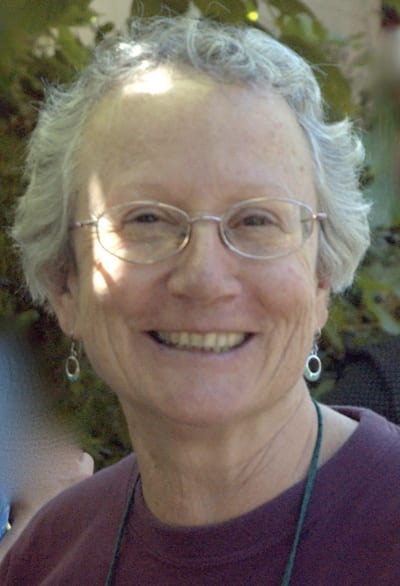
Sara Elkas - Photo: Supplied
Sara gained a Bachelor of Applied Science in occupational therapy, a postgraduate Diploma in Library Studies and an MA in Indian history. She worked as a special collections and reference librarian, a research officer and an occupational therapist with people with intellectual disabilities.
Sara lived in Sydney, Perth, rural WA and Darwin before settling in Melbourne, where she became active in the thriving lesbian-feminist scene of the early 1980s. She was a member of the Women's Liberation Switchboard telephone information and referral service and a member of Women Against Rape. Her activism in these groups continued for more than a decade.
In one year, Sara helped organise two Women's Balls, raising the necessary funds to house the vital collectives in the Women's Liberation (WL) Building in West Melbourne.
Always a dedicated and hard worker, she helped to repair the newer WL Building in Fitzroy and was there for the clean-up when it closed in 1992.
In 1992, Sara co-founded the Jewish Lesbian Group of Victoria (JLGV), a social, support and advocacy group that raises awareness of Jewish lesbians and challenges invisibility and discrimination in both Jewish and lesbian communities.
For many years, Sara was a warm, welcoming first point of contact for new JLGV members. She compiled a monthly members' newsletter and undertook all the administrative tasks of JLGV.
Sara was proud of her Jewish lesbian identity and carried the JLGV banner at every Pride March in Melbourne and at Mardi Gras in Sydney, where JLGV made history as the first organised Jewish group to march.
Sara staffed the inaugural JLGV stall at the Jewish community festival, In One Voice: Concert in the Park, remaining characteristically strong and calm in the face of abuse. She continued to staff JLGV's stall each year the festival was held.
Sara was active in the Jewish Australian Lesbian Anthology Collective, as an editor and writer, contributing two stories to the online anthology, Jewish Lesbians Down Under (jlgvic.org/anthology.html). Sara featured in the 2014 film, It's Who We Are: Celebrating 20 Years of the Jewish Lesbian Group of Victoria, and was active on the film's production collective. She remained a dynamic and respected JLGV activist until her very last days.
Sara was also a founding member of the Matrix Guild of Victoria, established in 1992 to provide a voice for lesbians aged over 40. She was actively engaged in all aspects of Matrix Guild. She continued as an office-bearer until her ovarian cancer diagnosis in 2013, and remained an active committee member until a few months before she died.
Her optimism, courage and determination were inspirational.
Sara was very proud of her involvement in setting up the first Australian affordable housing initiative specifically for older lesbians. Using her occupational therapy background, she helped to ensure that "Heather's Flats" incorporated well-designed, universal access. She was also instrumental in facilitating the funding and research resulting in four Matrix Guild publications, including We Live Here Too: A Guide to Lesbian Inclusive Practice in Aged Care, 2011.
Sara helped establish the Performing Older Women's Circus (POW) in 1995. She participated in weekly training workshops, learning a range of acrobatic and other circus skills. Sara took great pride in her clowning skills. In her multi-coloured wig and outfit, she was a sight to behold.
Sara performed in all POW shows from 1995 to 2006, including performing at the 2002 Gay Games in Sydney. She continued to train and perform with POW for as long as her health permitted.
Sara attended and contributed to national lesbian festivals and conferences during the 1990s, including the national 10/40 conferences. She single-handedly organised the final National 10/40 Conference in Victoria, in 1997.
In 2000, Sara became an active member of Women's Liberation and Lesbian Archives, later renamed as the Victorian Women's Liberation and Lesbian Feminist Archives (VWLLFA) Inc. She was active in the VWLLFA for 17 years.
Sara maintained her passionate interest in preserving our herstory, and ensured that the JLGV, POW and Matrix Guild archives, and her own personal files and photos, were included in the collection. Sara's poetry and prose (published and unpublished), diaries and notebooks are available through VWLFFA, now located within the University of Melbourne Archives.
Sara built and sustained many community organisations, working tirelessly with humility and integrity. She willingly took on the mundane but necessary tasks that maintain healthy community organisations. Once committed to something, Sara saw it through. Her dedication and diligence nourished these organisations.
Sara continued to be an active member and supporter of her communities until her death. Thanks in part to her determined efforts, these vital organisations will continue to bear fruit.
In her later years, Sara became very interested in genealogy, researching the many family members who had been murdered in the Holocaust. She travelled to Europe to pay homage and retrace her family's journeys.
After her cancer diagnosis, Sara became active in Ovarian Cancer Australia, and was dedicated to community education about the difficult-to-diagnose disease. Sara was particularly passionate about raising awareness of the increased risk factors that lesbians face with respect to ovarian cancer.
In 1994, Sara began a relationship with Ros (Shoshi) Goldman, whom she met through JLGV. Theirs was a powerful relationship, based on deep love and affection, shared goals and mutual respect across differences. Sara and Shoshi were a team whose love and support for one another was palpable. In the last weeks of Sara's life, they formalised a Registered Domestic Relationship.
Sara was a compassionate, loyal and loving friend who listened with an open heart and mind. Generous in spirit, with a delightful sense of humour, she dealt with life graciously and with aplomb. Her optimism, courage and determination were inspirational.
Her smiling face and non-judgmental support sustained her many, diverse and deep friendships. She faced her cancer as she had lived her life: calmly, with equal parts pragmatism and positivity. She showed extraordinary courage as she dealt with ovarian cancer, a total hysterectomy and double mastectomy.
Sara died peacefully on March 14, 2017 with her life-partner of 23 years, Shoshi, by her side. Aged 67, Sara had so much life left to live. Her outstanding contribution to Jewish lesbian, lesbian feminist and broader communities is deeply cherished and sorely missed.
Sara is survived by Shoshi, her grandchildren – a joyful and adored part of her life – and her many loving friends in Australia and around the world. Sara Elkas changed our communities and our lives. We are richer for having known her and poorer for her passing.
* Written by Hinde Ena Burstin, Anneke Deutsch, Sandra Padova, Robyn Peck and Jean Taylor
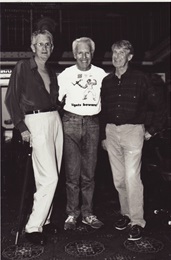
Peter de Waal's book launch, Parliament House, Sydney NSW on Friday 4 November 1994, photo by Geoff Friend Photography
Austin famously suggested that gay rights demonstrations should become a street party, leading to the first Mardi Gras in 1978.
Jesse Jones — 15 April 2019
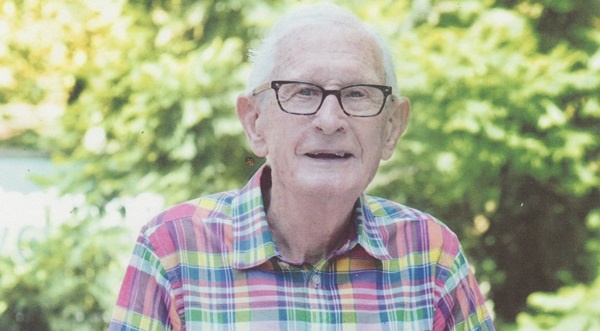
Ron Austin. Image: Ann-Marie Calilhanna.
Veteran gay rights campaigner Ron Austin – who in 1978 first suggested the idea of holding a street party in Sydney, which led to Mardi Gras’ inception – has passed away, aged 90.
Austin was an early member of the Campaign Against Moral Persecution (CAMP) and famously suggested that gay rights demonstrations should become a street party, leading to the first Mardi Gras in 1978.
He also been affectionately referred to as the ‘Godfather of Mardi Gras’.
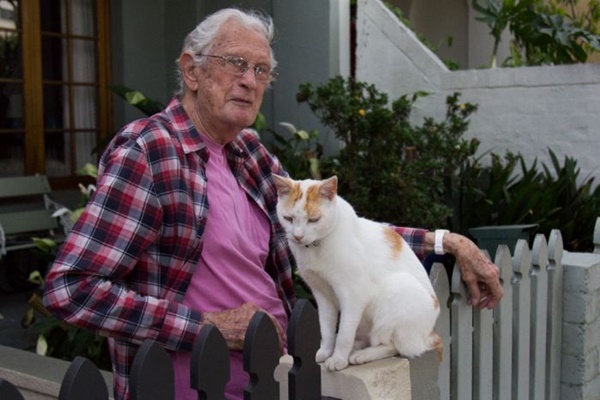
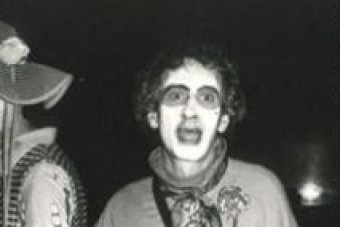
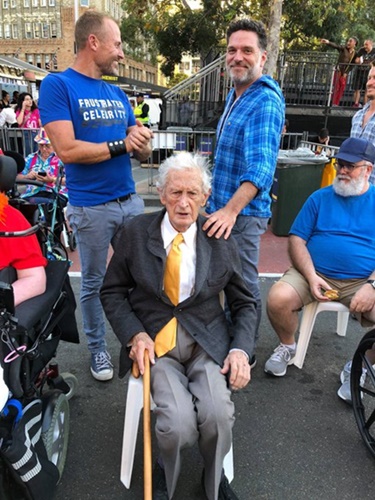
“Mardi Gras is about celebrating who we are. Celebrating our history, our survival, and the achievements of many great people who are gay and lesbian.”
He has been remembered fondly by friends and prominent figures throughout the LGBTI community, with tributes flowing on social media calling him a hero and a trailblazer.
Fellow ’78er, Steve Warren, said Austin often “thought outside the box”.
“When [our] protests were not gaining results, Ron came up with the idea of ‘a celebration of who we are’ and Mardi Gras was born,” he said.
“No-one could have predicted where that first 1978 Mardi Gras would take us, but it led to positive change that continues to this day with the much celebrated Sydney Gay and Lesbian Mardi Gras.
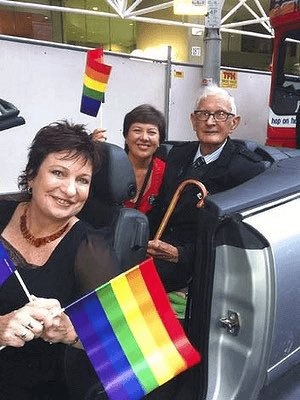
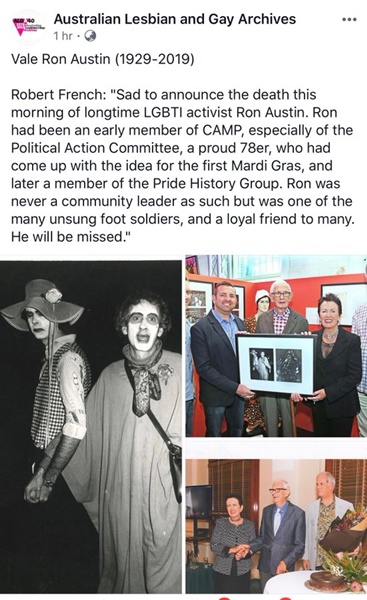
A dedicated activist, Austin marched in the Mardi Gras Parade for decades.
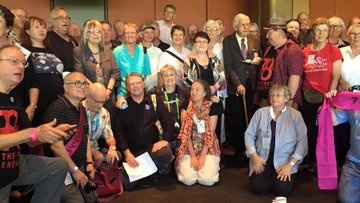
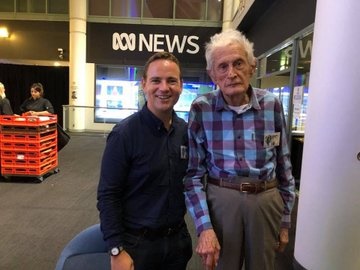
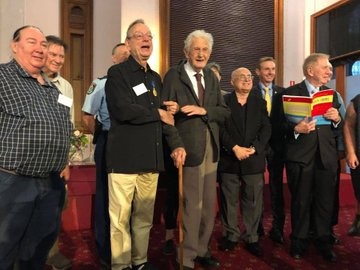
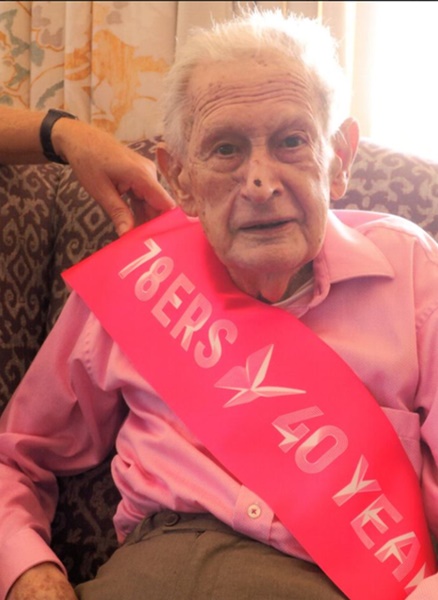
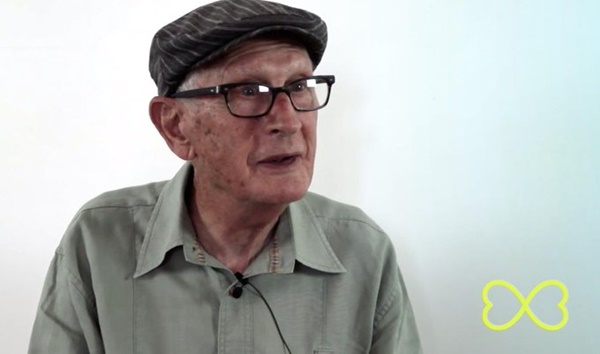
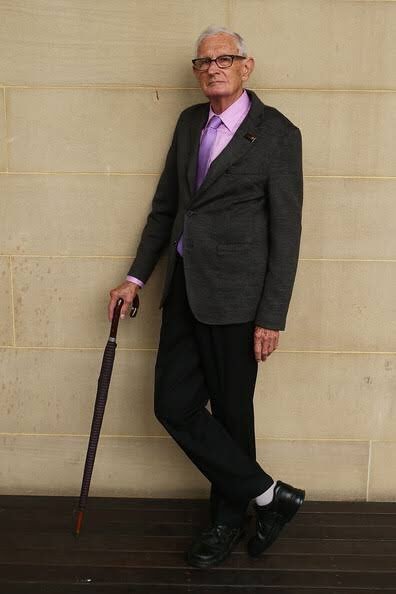
Jesse is Star Observer's senior journalist. His background is in public health and sex work, and his special interests include health, gender and travel. When he's not writing, Jesse is into movies, martial arts and margaritas.

born 10 December 1950, died 19 March 2019
Attachment(s) from Gary Jaynes
Sad news has reached us of the death of John Storey in Sydney, after a long illness. John will be remembered by many on this list as a comrade and friend. His photographs depict significant moments in the Australian Gay Liberation movement such as the first demonstration outside NSW Liberal Party headquarters in 1971, through to his photographs of venues, events and identities in the 2000s. Sydney's Pride History Group interviewed John for its oral history project, and ALGA holds a large collection of John's work.

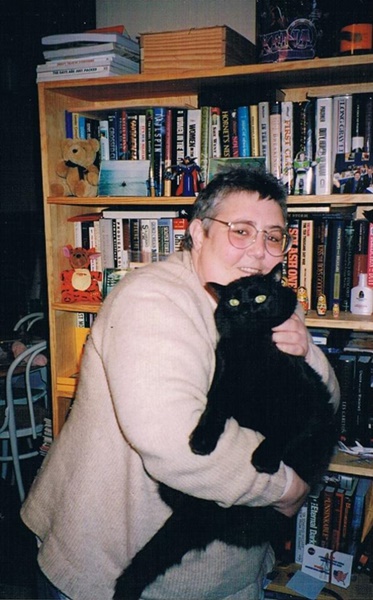
Sad news from Geoff Allshorn. Kate was a volunteer and committee member with ALGA in the late 1990s. Funeral details to be advised. Shocked to hear that Kate Doolan passed away on Monday last week [27.1.2019].
She was a friend for the best part of thirty years.
Kate loved space, dinosaurs, Abba, cricket, and crocodiles. She also had interests in military history and US politics.
She was a published author on a variety of space topics, most significantly writing a chapter about the Apollo 1 fire for a book on 'Fallen Astronauts'. Kate also approached LGBTI activism with a passion.
Kate had a difficult life but she always approached everything with startling gusto and enthusiasm.
Although we lost contact towards the end, she remains a deeply loved friend. She will be missed.

born 13 March 1945, died 29 October 1992
Ken (Joe) McClelland
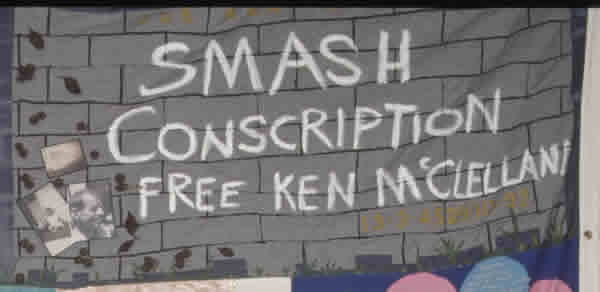
Free Ken McClelland!
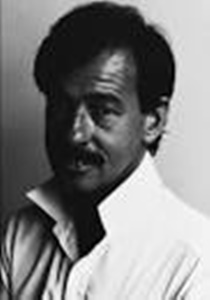
Ken’s role in the battle against AIDS though was a considerable less conflictual and political one. He was the first Convenor of the North Area Support Group of the VAC/GMHC and spent many hours developing the systems and training necessary to skill up the members of his group to be able to care for the members of their PLWHA clients. North group was the first to have a client load in the mid 1980’s and Kens work with the group helped make it a model for other area groups to follow.
Member of the North Group in the eighties remembers Kens inclusive, consensual style, his ability to listen and carefully match volunteers with the tasks that reflected theirs skills and interests as the hallmarks of his leadership. He was highly committed to working with people at a “grass roots” level and to following principles of community development.
In the latter years of his life, he preferred to be known as Joe. His work with the Support programme as well as his warmth and charisma had endeared his to many in the HIV community. His legacy and name will not be forgotten.

The copy of the SSO was provided by Gary Jaynes from the Australian Lesbian and Gay Archives collection in AUGUST 2019. It included the following obituary items:
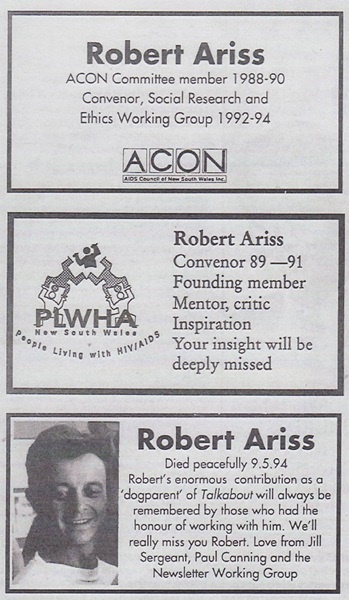
Robert M. Ariss, PhD, was an activist, advocate and anthropologist, not an unusual combination but in his case a unique one. He was an activist in the Sydney gay and lesbian community (as it was then called), an advocate for the rights and concerns of those infected with, and affected by, the Human Immunodeficiency Virus (HIV) and its, at one time, terminal consequence, Acquired Immune Deficiency Syndrome (AIDS), and an intelligent, anthropological observer of the politics and culture of those who became his people—those people living with AIDS (PLWA, as was the term at the time of Robert’s death in 1994; now PLHIV). When AIDS claimed Robert Ariss on 9th May 1994 at the age of 32, the Sydney gay and lesbian community lost a significant member, the Australian PLHIV community lost one of its most passionate voices, and his scholarly colleagues lost an irreplaceable talent and original thinker.
Surprisingly, in talking with those who knew and worked with Robert in order to write this obituary, I found very few of us had many details on his background and all regarded him as a warm if reserved and somewhat undemonstrative man. We understand he was born to a British family who migrated to Brisbane at some point early in his life. This fairly ordinary family was certainly somewhat nonplussed by this academically brilliant son, who later came to Sydney and, unbeknown to them, became involved with the gay and lesbian community. Soon, his successful studies led to enrolment in the doctoral program in anthropology at the University of Sydney. However, the HIV epidemic in Sydney and Australia had already begun and was taking its toll on gay men in particular, with deaths beginning in 1982 and spiralling throughout the 1980s. No one active in the gay and lesbian community could escape its effects as, one by one, many gay men found they were infected and those who were not infected found their sexual and relational lives irrevocably changed. Many gay men and lesbians, and many caring others, became involved as volunteers, as carers, as health workers supporting those fighting the debilitating effects of the infection, in research to understand the virus, its transmission modes, and how to prevent transmission with better health education, and as advocates trying to secure an adequate and non-discriminatory Australian governmental response. It was a galvanising and intensive time. The epidemic seemed without end; it hasn’t ended still. There was no way, surrounded by all of this, that Robert Ariss could not be involved. That involvement became central to Robert’s life when he too was diagnosed with HIV infection.
There is more to the sum of one’s life than a list of achievements. Mention could be made of the joy of friendships, the complex entwining that is family, the excitement and optimism of youthful activism, the pleasures of intimacy with lovers, the companionship of housemates, and particularly to academics such as Robert, realising the impact of really useful knowledge on the lives of others. Here I can only address some of these as, the private and reserved Robert Ariss has left little trace of many elements of his life. His notebooks are anthropological in format and content; they are not personal diaries. However, there are a number of achievements, among many, that deserve special mention in this account, one that can only ever be inadequate.
Robert’s activist life had many moments, but the few noted below gesture to the times in which he lived and loved, and the context of gay and lesbian lives at the time. Robert was a delegate at the last Australian national homosexual conference, that much we know as he found out he was diagnosed with HIV infection during that conference. These conferences had occurred since 1975 and his participation in the last conference (if not more) placed him at the centre of the most advanced political and theoretical thinking on sexuality and politics at that time in this country. For a period, he was involved as a volunteer telephone counsellor and educator in the AIDS Council of New South Wales (ACON) in Sydney, then Australia’s largest gay community-based, non-governmental, AIDS service organisation. He was also a working member of several ACON committees between 1988-1990. His contribution at that time exemplifies the intersection of gay and lesbian liberation and HIV/AIDS advocacy that marked the trajectory of so many of us and was a hallmark of the community response to the epidemic.
His HIV infection undoubtedly shifted Robert’s focus to PLWA. With few, only partial, treatment options available that time, the future of those infected was then bleak, surrounded as all gay men were with so many, too frequent, cruel deaths. Something more was needed to chase the possibility of a future, to secure living with (not dying from) AIDS for those doing so. Robert became a founding member of, and leader in, the development of the first, clearly defined, PLWA political response in this country in establishing PLWA (New South Wales [NSW]), now Positive Life (NSW). He largely drafted its constitution and was its first convenor from 1989 to 1991. He was also secretary of the National People Living with AIDS Coalition and a member of the Australian National Council on AIDS from 1990 to 1992. PLWA (NSW) as an organisation gave voice to the concerns of PLWHA, separate from those of the larger gay and lesbian community’s response to the epidemic, and soon positioned the personal, social, economic, political and health needs of PLHIV at the centre of the response to the epidemic. Nowhere was this clearer than in the heartbreakingly slow development of effective treatment of HIV infection. To that end, in 1988 PLWHA (NSW) developed a regular newsletter mailed to members and available at gay venues and HIV/AIDS services entitled ‘Talkabout’. In those pre-internet days when only Australia’s universities and the military had these infant technologies, ‘Talkabout’ became the most influential site of detailed, informed, internationally sourced news of PLWHA treatment advances and policy discussion in Australia. In her obituary for Robert in ‘Talkabout’, Robert’s long-term friend and colleague, Jill Sergeant, noted he was dubbed the ‘Dog-[i.e. God] father of “Talkabout”’ by the Sisters of Perpetual Indulgence, the activist Sydney-based chapter of an international order of gay male nuns. Jill, however, suggested he should be thought of as one of its ‘birth-parents’.1 Robert was deeply committed to ‘Talkabout’ because of the role it played in empowering people with HIV by giving them a voice. Indeed, the tagline of the publication was: ‘Where we speak for ourselves’, and he did everything he could to facilitate that, including sometimes sharing aspects of his own experience in stories in the magazine. His contributions to ‘Talkabout’ also relied heavily on his intelligent and objective approach to the science and politics of HIV/AIDS. It was here that his academic and critical skills were never more in evidence.
It is those skills that fed both from and into Robert’s work as an academic. During the period he was pursuing his doctoral studies at the University of Sydney. His doctoral research eventually focused on the development of the PLHIV movement in Sydney, its conceptualisation, underlying theories, politics, key issues and activities. At this time, Robert was also employed in the then National Centre for HIV Research at Macquarie University. He was working with me on a project assessing the social impact of the HIV epidemic on our gay communities in Sydney and Adelaide. It was a perfect project for an anthropologist like Robert. He was an intelligent and scholarly colleague. However, it was clear to his friends and colleagues that Robert’s health was deteriorating during 1993 and 1994, but his untimely death was still unexpected, deeply saddening and a shock to us all. Only two years later, the first significant breakthrough in HIV treatments was achieved. Robert had been awarded his PHD for his outstanding research on PLWHA politics and culture and was developing the manuscript into a book when he died. Robert’s birth family was deeply affected by his unexpected death, but his two loving sisters were determined that his research be published. At their request, and with the very able and skilled assistance of Graeme Skinner, I undertook to finalise Robert’s somewhat unfinished manuscript for publication. That book, Against Death: The Practice of Living with AIDS (with Gary W. Dowsett; Amsterdam: Gordon and Breach, 1997) is a testament to the intelligence, experience, compassion, sensitivity and life of this remarkable man who lived with HIV and AIDS. Robert Ariss was, as one colleague in the community HIV/AIDS sector called him after his death, ‘a quiet hero of the epidemic’.
Requiescat in pace, Robert.
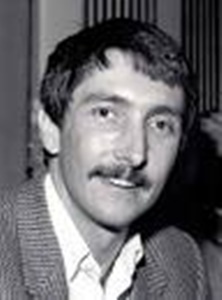
The photo comes from Sydney City Council during the 1980s when Brian became an Independent Councillor.
One of Sydney’s prominent gay activists during the past two decades has died.
Brian McGahen, politically active from his student days in the 60s, had been aware that he was HIV-positive for some years and during 1989 his condition had worsened dramatically. He had indicated to his very close friends that he had considered voluntary euthanasia to be an option he was prepared to take.
He died quietly on 2nd April 1990.
Brian McGahen’s public political activism began when he joined the Communist Party and the Draft Resisters Union in protest against the Vietnam war and the forced incvolvement of Australia’s young men.
From the early 70s he was active in the movement for gay rights in New South Wales. With some other gays he was instrumental in gay issues on the Communist Party’s agenda.
In 1979, during the International Year of the Child (IYC) when state funding was being made available to community groups for that purpose, the Gay Solidarity Group (GSG) applied for funding to conduct a forum on the ‘Child’s Developing Sexuality.’ It was Brian who guided the application through the homophobic bureaucratic maze and won approval for it.
However, the then NSW Minister for Youth and Community Services – the now discredited and jailed Rex Jackson refused to sign the order. GSG went ahead with the forum without any IYC funding as part of the 1979 Gay Solidarity Week which included the second annual Gay Madi Gras Parade.
Brian was later to become directly involved with the Mardi Gras as the Committee’s chair until 1984. In 1984 he was one of three openly gay people elected to the Sydney City Council on which he served as an Independent until the then NSW Labor Government sacked the City Council and installed unelected commissioners in 1987.
Although a controversial figure to some of his gay movement colleagues, Brian nevertheless was recognised as a bold but not always popular activist.
He was also extremely active and outspoken on very many AIDS issues. In 1984, after a large Candlelight Rally in front of the NSW Parliament Brian McGahen had this to say:
“I wasn’t overly happy about the meeting. I’m really concerned about this whole medicalisation of the AIDS question, the idea that doctors have to tell us what to do and the lack from the leaders of the AIDS organisations, the lack of any criticism of the medical profession and the way that our people are being treated.
In this case it’s a very specific situation we have, the community is challenged and what’s happening is we are being divided up on a medical model with doctors being made gods.
Now I am quite happy to accept the information from the doctors of course, but not uncritically in the way it’s been given to us.”
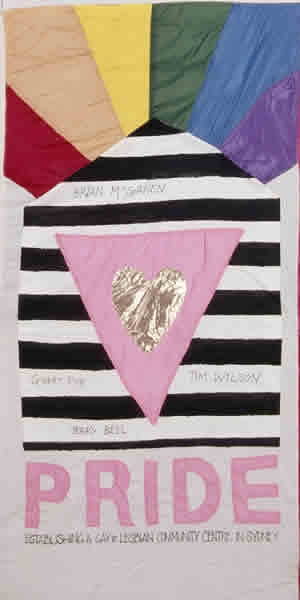


This obituary was sent to us by Gary Jaynes of the Australian Lesbian and Gay Archives on 27 SEPTEMBER 2019.
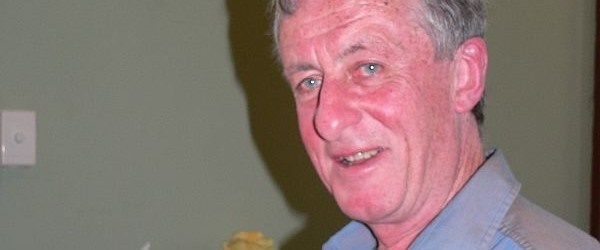
David Hudson – bookseller, editor, socialist and sometime Overland proofreader and fact-checker – has died.
Australian progressives of a certain generation will remember David as the face of the Communist Party’s International Bookshop in 17 Elizabeth Street, Melbourne.
He managed the shop between 1973 and 1987, a period in which it played a central role in disseminating radical ideas that simply were not available anywhere much else in Australia.
The novelist Christos Tsiolkas captured something of its importance:
"When I was 16, I nervously made my way up the steep stairs of the International Bookshop in Elizabeth Street, Melbourne. The bookshop, run by a socialist co-operative, was full of texts by Marx and Lenin as well as whole shelves of books on ecology, on feminism, on anti-racism and anti-colonial struggle. The reason I’d come into the bookshop was the word Gay on their sign outside on the street. It had literally leapt out at me, fascinating me and repelling me at the same time. Going up the stairs, I felt just like I was entering a porno shop. Once inside, I quickly ascertained where the ‘gay books’ were but I was still too nervous to wander over to that section . . . It still felt too public a declaration of my own ‘perversity’ . . . to be seen flicking through books meant for poofters. This was back then."David helped create that space.
The son of a bricklayer, he was born in Glasgow in 1943. Though he immigrated to Australia in 1950, that heritage was apparent in the faintest of burs when he spoke – as well as in the frail physique resulting from childhood malnutrition.
He grew up in Casterton, near Hamilton, on the South Australian border and then attended Melbourne University on an education department scholarship in the early sixties.
Like so many others at that time, he became a socialist. Unlike many, he stayed one for the rest of his life.
David was active in the Labour Club and the campaign against the Vietnam War. He was, as a student, politically close to the wing of the Trotskyist movement represented by (fellow bookseller) Bob Gould.
He wrote his Masters Thesis on the Victorian Teachers Union and briefly worked as a teacher before seizing the opportunity to work in the International Bookshop – a job much more conducive to his temperament.
The Communist Party maintained the shop as part of a nationwide cultural infrastructure. At various times, the CPA ran (or at least directed) national and state-based newspapers, theory journals, magazines, a distribution agency and bookshops in every major city.
David was never a member of the party, which, in some ways, makes his appointment to such a position seem strange. Yet political ecumenicism was in his nature. He once told me that he’d always classified the Left according to those who ‘were nice’ and those who were not – and that, in the bookshop, he found mostly the former, including his lifelong friends Olga Silver and Ken Norling.>
Certainly, he came at the right time. Kath Gleeson, the previous manager, had been a pioneer of women’s liberation, and had oriented the shop to the new ideas emanating from the social struggles.
As a result, the New International was one of the few places where, prior to the rise of commercial feminist publishing, the magazines and books of the women’s liberation movement could be purchased.
Later, the gay section became equally important. When my sister Jill and I interviewed David for our book Radical Melbourne 2, he explained:
When I started there were four or five narrow shelves all face on with gay stuff, the first thing you saw when you came in the door. This was probably some provocation of Kathy’s to improve some old party members’ view of the world.That last sentence perfectly captures his humour. He had a keen sense of the absurd and palpably delighted in the idea of homophobes forced to confront the gay erotica that the shop sold in huge quantities. In that same interview, he laughed remembering what he called the ‘occasional demented letters in Tribune from ancient persons complaining about sodomy and perversion’.
Yet as Tsiolkas’ anecdote suggests, back then, mainstream shops wouldn’t stock gay and lesbian literature. The International epitomised the historical link between sexual freedom and the radical Left.
In 1984 the shop was included in the National Times’ roundup of Australia’s best bookshops:
It’s twice the size it was a few years ago and also stocks a large selection of posters, records, badges and postcards, which like many of the books, are unobtainable elsewhere. (Where else could you find a badge which says, ‘Bigamy is the same as monogamy – one husband too many’?)
Even so, the International Bookshop was still a radical bookshop. David’s employment there made him, of course, a target for ASIO and other security agents. He recalled how, once a week during the seventies and eighties, a polite young woman appeared with a handwritten list of books and pamphlets, obviously copied from Tribune, which she would assiduously track down – much to the amusement of the staff:
It was so ridiculous. We felt like saying, you know, we do put aside things for people. Would you like us to set up a little folder for you –perhaps one with ‘ASIO’ written on it?
Then came the queen’s visit to Melbourne, when the security services realised with horror that the route of the official cavalcade brought the Royal Personage dangerously close to the International Bookshop:
And so they sent two Commonwealth Police around. They were terribly pleasant. They said, ‘We know that serious political people like you aren’t going to do anything but on the other hand some maniac might be lurking inside your building.’ So we did our best to assure them that we were clear of maniacs.
David left the International in 1987 and moved to Perth, in part to pursue a romantic relationship with a man there. He established his own shop called Missing Pages but without great success (he quipped it might have been called ‘Missing Customers’). After that, he worked for the Left Book Club and then became an editor at the Institute for Social Research at Swinburne.
He played an important role at the New International Bookshop in Trades Hall, where he kept accounts and attempted to teach a string of former activists (myself included) the rudiments of bookselling.
David had attended the founding meeting of the Melbourne branch of the Society for the Study of Labour History in 1962, and was passionate about the history of the Left for the rest of his life. He helped produce at least two classics of the genre: working with Bertha Walker on Solidarity Forever (her memoir of her father, Percy Laidler) and then with Wendy Loewenstein on her oral history of the Great Depression, Weevils in the Flour.
In conversation, he possessed a knack for making labour history come alive, not least because of his humour. When I worked at the New International Bookshop, he educated me about the genuine importance of key figures in the Australian communist movement, even as he told scurrilous stories about them. He delighted in irony and the grotesque but he was also very serious about the past, with the deep commitment to historical accuracy that made him such an effective proofreader.
In the fractious milieu of the left, David maintained genial relationships with people from widely different factions. He disliked dogmatism and once became quite upset when I wanted to read something he’d written on Leninism as a young activist – he found his old presumption embarrassing, he said.
At the same time, he remained deeply committed to the Left and its symbols, insisting, for instance, on attending the May Day rally each year.
Today, the internet has fundamentally changed intellectual life for the Left. Bookshops still matter but they are no longer the sole source of literature and ideas in the way that they once were. In a sense, David’s career represented a link back to an older tradition, one in which working-class autodidacts of the 1890s learned their politics in places like Andrade’s bookshop in Bourke Street.
I will remember him as a small figure standing behind a shop counter, surrounded by piles of books and receipts, discussing Lance Sharkey and the internal history of the Communist Party with a browser who patently isn’t going to buy anything at all.
David Hudson was a gentle and kind man, who embodied the best traits of the Left. Despite his own modesty, he helped make the world a better place, and many of us owe him a great deal.
David’s friends are planning a function in his honour some time in early November 2019. More details will be available soon.
Dr Beatrice Faust (known as Bea), feminist, political campaigner, journalist, author and academic, died on October 30 at the age of 80, after becoming ill at her home in Churchill, Gippsland.
Born Beatrice Eileen Fennessy in 1939, her mother died shortly after giving birth. Beatrice was brought up by her father and extended Irish family and later, a stepmother she disliked. Bea wrote later that she was “bored stiff” by most of her early life but flourished when she attended Mac.Robertson Girls’ High School where she was top of her class and won a scholarship to University Women’s College. At Melbourne University she graduated with a bachelor’s degree in English and then a master’s degree. Later in life, she was awarded a Ph.D.
Bea was married and divorced twice. Her first marriage was to Clive Faust, whose surname she kept. She had one child, Stephen, born in 1965, as a result of her relationship with the Finnish academic Adam (Aimo) Murtonen.
Bea was one of the first women to campaign for civil liberties, abortion law reform and sex education. In 1966 she co-founded the Victorian Council for Civil Liberties, mainly to campaign against censorship laws. She was best known for being the founder of the Women’s Electoral Lobby (WEL) in 1972.
I was one of the nine women Bea invited to her home in Carlton in February 1972 to discuss the idea of surveying candidates for the federal election on their attitude to women’s issues. Her inspiration came from an article in Ms magazine about how feminists had rated presidential candidates in the US. By the end of the meeting, we’d agreed to do the survey and publish the results, and WEL was born. It was very exciting.
Bea chose the nine women for their specific skills. Two of us were journalists, Carmen Lawrence (later premier of Western Australia) was a psychologist; there were several sociologists and a librarian.
Bea was then 33, a small, rather frail woman, who sometimes gasped for breath, having suffered from chronic asthma all her life. But she had a ready laugh, an indomitable spirit, and a clear view of what was needed. We drew up a list of issues that could be solved by legislation, including birth control, family planning, childcare and equality in work and education.
New members soon joined, and groups were set up to research each issue. Helen Glezer, a psychologist, led a team that designed the questionnaire, tested it and oversaw the training of the interviewers and the analysis of results. Other groups looked after public relations, finance and the newsletter.
Bea set off to other capitals to talk to women about setting up WEL groups and it was soon very active in Canberra, Sydney and Brisbane. By the end of the year, membership was up to several thousand, with branches in all states, and as far away as Darwin and Norfolk Island. Groups were formed in each electorate to monitor the candidates. Women who joined WEL said later, “it changed my life”.
It was a time of social and political change. The long-running conservative government was faltering under Billy McMahon, while the Opposition leader Gough Whitlam was gaining popularity. In the months leading up to the federal election, WEL interviewed all candidates willing to participate, and quizzed them at public meetings. Two women conducted each interview, and as one MP said: “They hunt in pairs.” This was the first time a survey of all candidates had been attempted in Australia.
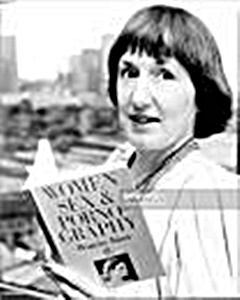
Most of the candidates were ignorant about women’s issues, and gaffes were frequent. In the Sydney electorate of Bennelong, veteran politician Sir John Cramer said: “A woman must be taught that her virginity is the most valuable thing she possesses.”
As WEL became more prominent it aroused hostility from conservatives and Australia’s spy agency ASIO, which regarded women’s rights as a communist agenda.
We printed a poster “Think WEL before you vote”, and in November 1972 The Age published the WEL survey in a green four-page “Women Voters’ Guide”. Prime minister Billy McMahon got one out of 40; Gough Whitlam got 33. Overall, WEL’s campaign was the most important third-party intervention in any federal election up to that time.
Bea Faust drove WEL forward in that first year, flinging out ideas at a rapid pace. She was a seasoned campaigner and understood far more about political lobbying than most of us. She said WEL was a collective effort, but some members of the Women’s Liberation Movement criticised her dominant role. WEL had a flat structure with no office-bearers. Meetings were held with a rotating chair and “consensus decision-making” rather than resolutions.
Bea was behind another campaign that year to get women into the Victorian public service, where the upper levels were for men only. Bea got women to apply, and two with unusual names were accepted. They turned up for the exam in June 1972 with WEL supporters and the media in tow and were allowed to sit the exams. They did well but failed the medical on the grounds they were female. WEL pursued the matter with premier Dick Hamer, who changed the policy.
In December that year, the Whitlam Labor government was elected, and went on to implement most of the policies in the WEL questionnaire. As the historian Marian Sawer has written: “The overall effect of WEL’s intervention in the 1972 federal campaign was such that political parties no longer felt comfortable going into election campaigns without a women’s policy.”
WEL went on to have other successful campaigns, including a public forum in Victoria in 1973 just before the state election, with all the party leaders on stage being questioned on issues like childcare. More than 2000 people attended, and it was subsequently televised.
Women who joined WEL were empowered by it and learnt a lot about politics and lobbying. Women who had been housewives went on to study, work or stand for local government or higher office. Many WEL members went on to positions of power and influence in politics, the public service, business and the community sector, spreading reforms for women in different ways. WEL today has a smaller membership, but still lobbies on feminist issues.
In 1974, Bea dropped out of WEL in order to concentrate on the Abortion Law Reform Association (ALRA) where she was president, and her writing.
As a journalist, she wrote for several newspapers and published four books: Women, Sex and Pornography (1980), Apprenticeship in Liberty, (1991), Benzo Junkie: More than a case history (1993) and Backlash? Balderdash! Where Feminism is Going Right, (1994).
In the latter part of her career, Bea became a lecturer in English at RMIT in Melbourne, then from 1990-2003 she was at Monash University’s campus at Churchill, Gippsland, where she was an educational designer in the Centre of Learning and Teaching Support. She retired at 67.
In 2001, Bea was awarded the Centenary Medal for service to the community through women’s issues and was inducted into the Victorian Honour Roll of Women. In 2004, she was appointed an Officer of the Order of Australia (AO) and in 2005 awarded the degree of LLD honoris causa at Monash University.
Bea Faust was courageous and inspired a whole generation through her work for civil liberties and for women. She will be greatly missed.
She is survived by her son, Stephen Faust.



